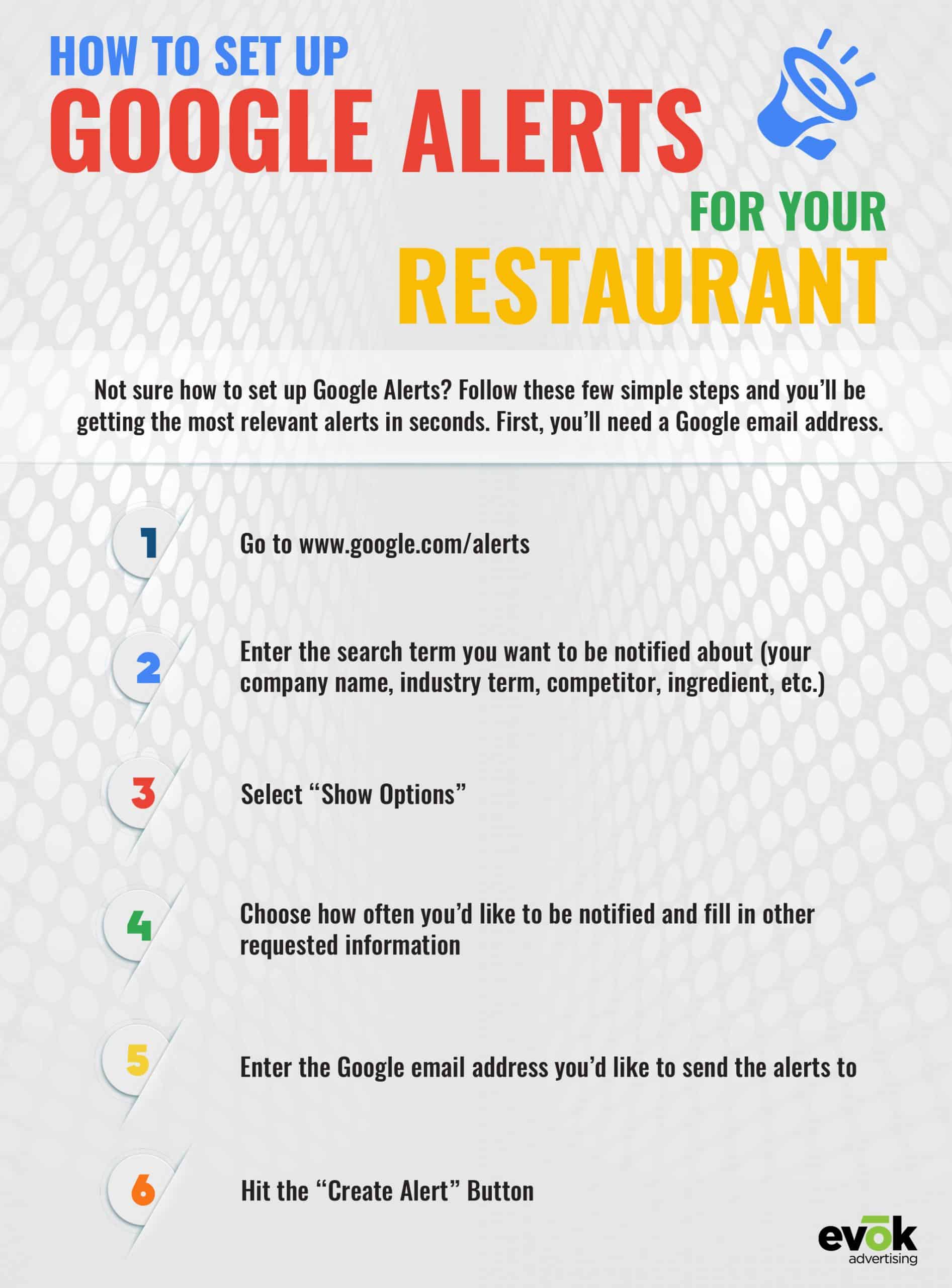
The Restaurant Marketing Toolbox Spotlight: Google Alerts

You may have heard of Google My Business, Google Ads, and Google Trends, but have you heard of Google Alerts? This is one of Google’s many free and useful online tools, but it seems like many quick-service restaurants haven’t heard of it or aren’t sure how to leverage this simple yet effective tool to their benefit. The primary function of this particular Google tool is to make it easy for you to get email notifications regarding stories or topics that you are monitoring. This information can be used in a variety of ways, but the possibilities of Google Alerts are endless.
The Benefits of Google Alerts
Google Alerts enables you to monitor the web for mentions of specific keywords or phrases. Once set up, you’ll receive email alerts whenever these phrases have been mentioned online. These alerts can benefit various aspects of your restaurant’s digital marketing strategy.
Manage Your Restaurant’s Online Reputation
Since Google Alerts track when your QSR’s name shows up in new web content, you can be aware of who is talking about you and what they are saying. It also tracks mentions in social media conversations. This is a great PR tool, as it allows you to stay on top of your restaurant’s online reputation, respond to mentions in a timely manner, and share good reviews on your social media.
Track Backlinks
Google Alerts can also be set up to notify you when another site links to your page. Link building is essential for any SEO strategy, but especially for restaurants with blogs. You want to know which sites are linking to your content and are helping you generate website traffic. This also helps you identify who is talking about you and utilize that information to your advantage. Has a foodie influencer who visited your restaurant praised your excellent customer service on her blog? Take this as an opportunity to collaborate with an influencer and get more customers in your door.
Keep an Eye on Your Competitors
It can be difficult and time-consuming to keep up with what your competition is doing. Luckily, Google Alerts does the hard part of collecting mentions of your competitors and creating monthly or weekly alerts with a nice snapshot of what they are doing.
Moe’s Southwest Grill might want to set up alerts for “Tijuana Flats” and “Chipotle” to keep an eye on what ingredients they are using, what new menu items they are bringing to their menu, and what they are doing to make their service experience more unique. Being aware of your competition and their activity is essential to thriving in the QSR industry. Not only can you learn from their mistakes, but you can see what shifts they are making and stay ahead of the trends.
Stay on Top of Industry Topics
Every day new articles and reports are being published on the food and beverage industry. By creating alerts on key industry terms, you won’t ever miss timely news updates, up-and-coming trends, or the opportunity to join the latest foodie fad.
How to Set Up Google Alerts
Not sure how to set up Google Alerts? Follow these few simple steps and you’ll be getting the most relevant alerts in seconds. First, you’ll need a Google email address.
And you’re all set! Managing your restaurant’s online reputation has never been easier, and now you’ll be an expert on all the latest industry news.
Google Alert Hacks and Tips

Eliminate notifications that aren’t relevant to your QSR by defining your search queries with these simple tips:
- Consider adding quotes (“ “) around your restaurant’s name or desired keyword to make sure results match the phrase exactly and not just partially. This will help Google know that you only want to track that query when the words are strung together and ensure that irrelevant results stay out of your inbox.
- If you have a common restaurant name, add the location to the keyword phrase. That way you’re sure to get notifications about mentions of your restaurants, and not Johnny’s Café in another state.
- If you want a word or phrase excluded from the search query enter a minus sign before (e.g., Mexican food – tacos). This lets Google know what alerts to track and what to avoid. You could do this if someone on your executive team shares a name another prominent person (Steve Jobs – Apple), or if your restaurant uses similar products to competitors in the industry.
- Include common misspellings of your search terms and common variations of your restaurant’s name to make sure you are catching all the references your customers might be using.
Google Alerts is another tool you can add to your restaurant’s digital marketing toolbox. When used to its full advantage you can optimize keywords on your website or blog, manage your restaurant’s online reputation, stay up to date with industry trends, and keep an eye on your competitor’s activities. Take some time to play around with Google Alerts and see how it can benefit and enhance your QSR’s marketing plan.